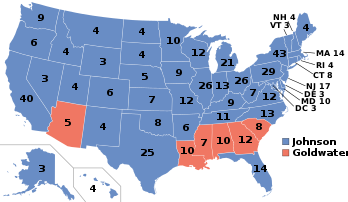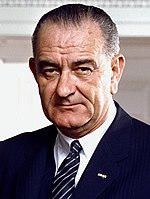
Back انتخابات الرئاسة الأمريكية 1964 Arabic Præsidentvalget i USA 1964 Danish Präsidentschaftswahl in den Vereinigten Staaten 1964 German Προεδρική εκλογή των Ηνωμένων Πολιτειών 1964 Greek Elecciones presidenciales de Estados Unidos de 1964 Spanish انتخابات ریاستجمهوری ایالات متحده آمریکا (۱۹۶۴) Persian Yhdysvaltain presidentinvaalit 1964 Finnish Élection présidentielle américaine de 1964 French הבחירות לנשיאות ארצות הברית 1964 HE 1964-es amerikai elnökválasztás Hungarian
| |||||||||||||||||||||||||||||
538 members of the Electoral College 270 electoral votes needed to win | |||||||||||||||||||||||||||||
|---|---|---|---|---|---|---|---|---|---|---|---|---|---|---|---|---|---|---|---|---|---|---|---|---|---|---|---|---|---|
| Turnout | 62.8%[1] | ||||||||||||||||||||||||||||
| |||||||||||||||||||||||||||||
 Presidential election results map. Blue denotes states won by Johnson/Humphrey and red denotes those won by Goldwater/Miller. Numbers indicate electoral votes cast by each state. | |||||||||||||||||||||||||||||
| |||||||||||||||||||||||||||||
The 1964 United States presidential election was the 45th quadrennial presidential election. It was held on Tuesday, November 3, 1964. Incumbent Democratic President Lyndon B. Johnson defeated Republican Senator Barry Goldwater in a landslide victory. Johnson was the fourth and most recent vice president to succeed the presidency following the death of his predecessor and win a full term in his own right. Johnson won the largest share of the popular vote for the Democratic Party in history, 61.1%, and the highest for any candidate since the advent of widespread popular elections in 1824.
Johnson took office on November 22, 1963, following the assassination of John F. Kennedy, and generally continued his predecessor's policies, except with greater emphasis on civil rights. He easily defeated a primary challenge from segregationist Alabama Governor George Wallace to win the nomination. At the 1964 Democratic National Convention, Johnson selected liberal Minnesota Senator Hubert Humphrey as his running mate. In the narrow Republican contest, conservative Arizona Senator Barry Goldwater defeated liberal New York Governor Nelson Rockefeller and Pennsylvania Governor William Scranton.
Johnson championed a series of anti-poverty programs, collectively known as Great Society, and his passage of the Civil Rights Act of 1964. Goldwater espoused a low-tax, small-government philosophy with an aggressive foreign policy. Although he personally opposed segregation and previously supported the Civil Rights Act of 1957 and 1960, Goldwater opposed the Civil Rights Act of 1964, saying it was unconstitutional. Democrats successfully portrayed Goldwater as a dangerous extremist, most infamously in the "Daisy" television advertisement. The Republicans were divided between its moderate and conservative factions, with Rockefeller and other moderate party leaders refusing to campaign for Goldwater. Johnson led by wide margins in all polls during the campaign.
Johnson carried 44 states and the District of Columbia, which voted for the first time in this election. Goldwater won his home state and swept the five states of the Deep South, due to the Democratic Party's strong support of civil rights and desegregation. Several southern states had not voted for a Republican presidential candidate since the end of Reconstruction in 1877. This was the last election in which the Democratic Party won a majority of the white vote, with 59% of white voters shunning Goldwater for Johnson. This was the last election in which the Democratic nominee carried Idaho, Utah, Wyoming, North Dakota, South Dakota, Nebraska,[a] Kansas, or Oklahoma, and the only election ever in which the Democrat carried Alaska. This marked the first presidential election in history in which a Democrat carried Vermont, and conversely, the first in which a Republican carried Georgia. This was also the last election until 1992 in which the Democrat carried California, Colorado, Illinois, Montana, Nevada, New Mexico, New Jersey, New Hampshire, or Vermont, as well as the last election until 2008 in which the Democrat carried Virginia or Indiana. As such, this was the most recent presidential election in which the entire Midwestern region voted Democratic. As of 2024, this marks the last time that a Democratic presidential candidate has won more than 400 electoral votes.
- ^ "National General Election VEP Turnout Rates, 1789-Present". United States Election Project. CQ Press.
Cite error: There are <ref group=lower-alpha> tags or {{efn}} templates on this page, but the references will not show without a {{reflist|group=lower-alpha}} template or {{notelist}} template (see the help page).
© MMXXIII Rich X Search. We shall prevail. All rights reserved. Rich X Search

